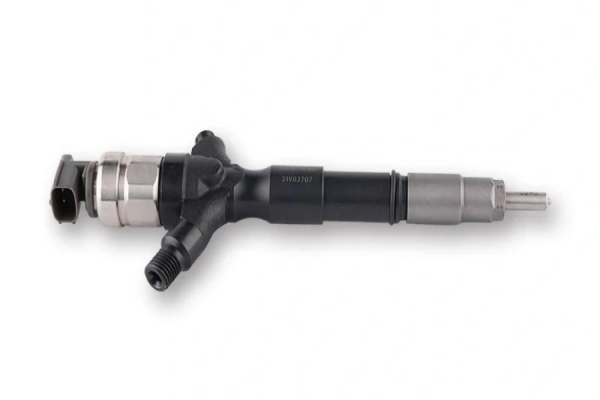What are Fuel Injectors?
Diesel fuel injectors are devices that are used to deliver fuel to the engine of a diesel-powered vehicle. They work by injecting a precise amount of fuel into the engine's combustion chamber at the right time, under high pressure. This helps to optimize the fuel-air mixture in the engine, which is necessary for efficient and effective combustion.
-
Engine Make: Denso
-
Inspection Report: Yes
-
Warranty: 12 months
-
Engine Make: Denso
-
Inspection Report: Yes
-
Warranty: 12 months
-
Engine Make: Denso
-
Inspection Report: Yes
-
Warranty: 12 months
-
Engine Make: Denso
-
Inspection Report: Yes
-
Warranty: 12 months
-
Engine Make: Denso
-
Inspection Report: Yes
-
Warranty: 12 months
-
Engine Make: Denso
-
Inspection Report: Yes
-
Warranty: 12 months
-
Engine Make: Denso
-
Inspection Report: Yes
-
Warranty: 12 months
-
Engine Make: Denso
-
Inspection Report: Yes
-
Warranty: 12 months
-
Engine Make: Denso
-
Inspection Report: Yes
-
Warranty: 12 months
-
Engine Make: Denso
-
Inspection Report: Yes
-
Warranty: 12 months
-
Engine Make: Denso
-
Inspection Report: Yes
-
Warranty: 12 months
-
Engine Make: Denso
-
Inspection Report: Yes
-
Warranty: 12 months
Features of Fuel Injectors
Fuel injectors are electronically controlled valves that precisely meter and spray fuel into a combustion chamber, crucial for optimal engine performance and fuel efficiency. They atomize the fuel into a fine mist, allowing for complete combustion and reducing emissions. Fuel injectors are part of the fuel injection system, which delivers fuel to the engine cylinders.
Applications of Fuel Injectors
Fuel injectors are essential components in modern internal combustion engines. They play a critical role in optimizing engine performance, fuel efficiency, and emissions. Here are some key applications of fuel injectors:
1. Automotive Industry
Internal Combustion Engines (ICE): Fuel injectors are used in gasoline and diesel engines to deliver fuel into the combustion chamber. They ensure that the right amount of fuel is injected at the correct time for efficient combustion.
Direct Injection (DI): Modern engines use direct injection fuel systems, where fuel is injected directly into the combustion chamber, providing better fuel efficiency and performance.
Turbocharged and Supercharged Engines: Fuel injectors are used to ensure precise fuel delivery to engines with forced induction, allowing them to handle increased pressure and power demands.
Hybrid and Electric Vehicles: Although electric vehicles do not use fuel injectors, hybrids with internal combustion engines still rely on them for efficient fuel delivery.
2. Aerospace
Aircraft Engines: Fuel injectors are crucial in jet engines, where they atomize fuel before injecting it into the combustion chamber. They help optimize fuel combustion and efficiency at high altitudes and varying speeds.
Rocket Engines: Fuel injectors are used to mix fuel and oxidizer in rocket engines, ensuring precise delivery for controlled and efficient combustion in space missions.
3. Motorcycles and Powersports
Motorcycle Engines: Fuel injectors in motorcycles, especially in sportbikes and high-performance models, help improve throttle response, fuel efficiency, and emissions.
All-Terrain Vehicles (ATVs): Similar to motorcycles, fuel injectors in ATVs ensure that fuel delivery is optimized for various terrains and conditions.
4. Marine Applications
Marine Engines: Fuel injectors are widely used in marine engines, including those powering ships, boats, and other watercraft. They help to ensure fuel efficiency and reduce emissions, particularly in larger commercial vessels and recreational boats.
Diesel Marine Engines: Many large marine vessels, including cargo ships and ferries, use diesel engines equipped with advanced fuel injectors to maintain performance and minimize emissions.
5. Agricultural Machinery
Tractors and Harvesters: Diesel-powered agricultural machinery relies on fuel injectors to provide the right fuel-to-air mixture for optimal engine performance, especially in demanding conditions such as plowing or harvesting.
Irrigation Pumps: Fuel injectors are used in irrigation systems that rely on internal combustion engines to pump water, improving fuel efficiency and performance.
6. Heavy Duty and Commercial Vehicles
Trucks and Buses: Fuel injectors in diesel-powered trucks and buses ensure reliable fuel delivery for long-haul travel, reducing fuel consumption and enhancing engine life.
Construction Equipment: Excavators, bulldozers, and other heavy construction machinery use fuel injectors for efficient diesel fuel combustion, ensuring reliable power for demanding operations.
7. Small Engines and Generators
Portable Generators: Fuel injectors are used in small, portable generators to provide efficient fuel delivery and ensure stable power output.
Lawnmowers and Other Small Engine Equipment: Many modern small engines in equipment like lawnmowers and chainsaws use fuel injectors for optimized fuel efficiency, reducing emissions compared to older carburetor systems.
8. Performance Tuning and Motorsport
Racing Engines: High-performance engines used in motorsports like Formula 1, NASCAR, and drag racing rely on fuel injectors to manage large amounts of fuel delivery under extreme conditions, helping optimize power and efficiency.
Aftermarket Tuning: Car enthusiasts and professionals may upgrade fuel injectors to higher flow rates to meet the needs of modified engines, ensuring that the engine receives the appropriate amount of fuel for increased horsepower and performance.
9. Alternative Fuels and Flex-Fuel Vehicles
Flex-Fuel Vehicles (FFVs): Fuel injectors in FFVs are designed to handle a variety of fuels, such as ethanol, methanol, and gasoline. They adjust fuel delivery based on the type of fuel being used to optimize combustion and emissions.
Natural Gas Vehicles (NGVs): In vehicles that run on compressed natural gas (CNG), fuel injectors are adapted to inject natural gas into the combustion chamber, helping maintain performance similar to gasoline-powered engines.
10. Industrial and Research Applications
Fuel Research and Development: Fuel injectors are used in laboratories and research facilities to test fuel efficiency, combustion characteristics, and emissions of new fuel types and engine designs.
Power Plants: Fuel injectors are used in power plant engines to ensure controlled and efficient combustion of fossil fuels for electricity generation.












